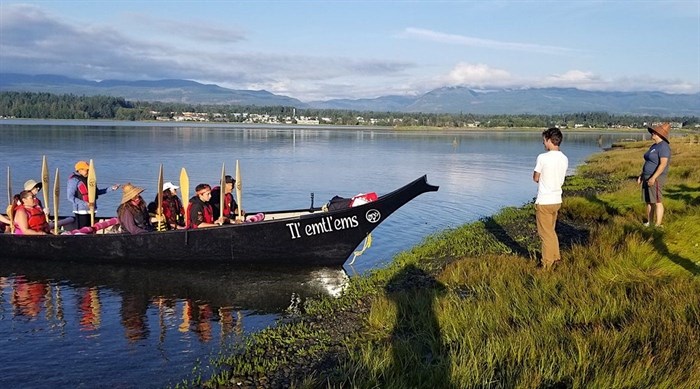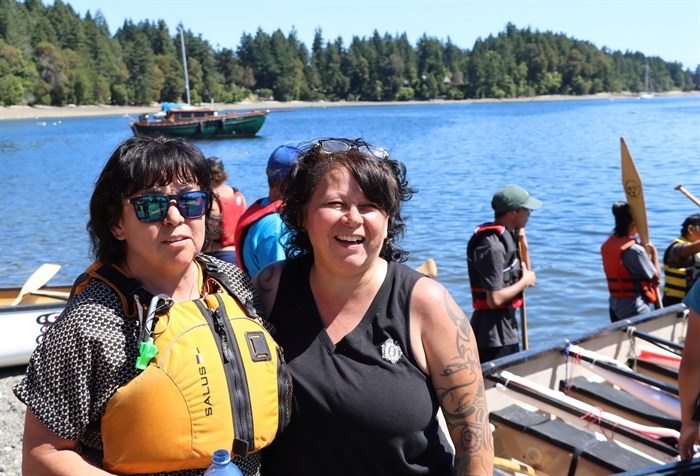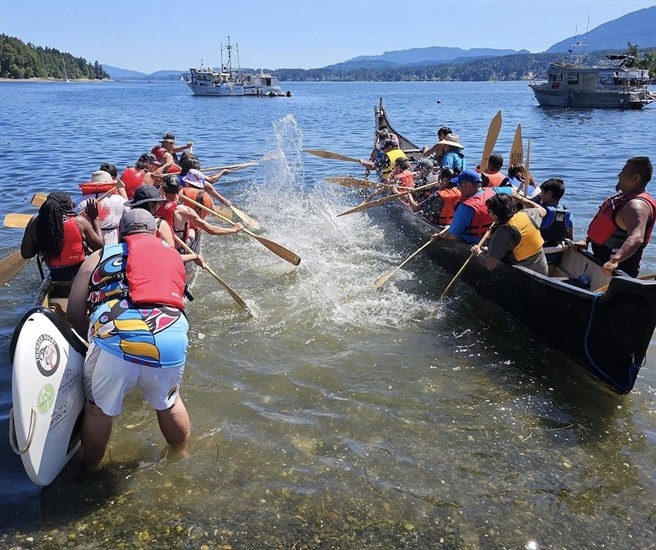
Klahoose Nation’s Tl'emtl'ems Canoe is one of hundreds joining a flotilla of Indigenous paddlers for the 2023 Tribal Journey to Muckleshoot.
Image Credit: Michelle Robinson
July 25, 2023 - 1:58 PM
A flotilla of Indigenous canoes a hundred strong is converging along the Pacific Northwest as nations from Canada, the U.S. and beyond paddle hundreds of kilometres in pursuit of shared objectives and a common destination.
Paddlers from eight different canoes were hosted, fed and sheltered by the Stz'uminus First Nation near Ladysmith on Vancouver Island before launching Thursday on their first leg of the Tribal Journey, said Michelle Robinson, a member of the Klahoose Nation’s Tl'emtl'ems canoe family.
The yearly summer event sees Indigenous people from across the West Coast make the voyages of their ancestors to reclaim and revitalize their cultures and traditions, and strengthen future generations, Robinson said.
“It's really powerful because a lot of our paddlers are on a healing journey because we have historical trauma,” she said.
Colonialism aimed to erase First Nations culture and language, and control Indigenous Peoples’ movements, Robinson said.
“Indian Affairs, the churches and the powers that be at the time told us we couldn’t even put our paddles in the water to go to the next village to visit our grandmothers,” she said.
“So, it’s amazing to get in the canoe and travel together.”

Michelle Robinson, a member of the Klahoose Nation’s Tl'emtl'ems canoe family, along with a paddler after being welcomed to Stz'uminus First Nation territory for the launch of their Tribal Journey to Muckleshoot.
Image Credit: SUBMITTED
Canoe families from across Alaska, B.C., Washington and Oregon are travelling along set routes, joining up at host communities along the way until critical mass is reached and the entire flotilla arrives at the Muckleshoot Indian Nation in Washington state on July 30 for a week of celebration and ceremony.
At each stop during the journey, paddlers and the host nation conduct ceremonial protocol, where canoe families request and receive formal welcome to come ashore, Robinson said. Every landing involves a feast and cultural exchange, she added.
“Each canoe family steps on the floor. It's just like a potlatch: they gift, they dance and share songs.”
But by the time the flotilla arrives at Muckleshoot for the grand gathering, approximately 130 canoes and hundreds of paddlers, family members, nations and support crews will gather in solidarity, she said.
Paddlers of all ages and abilities are welcome to participate in the journey even if just for a day or two, Robinson said, adding last year one canoe family had a paddler who was in her 90s. This year, Klahoose Elder Mary Harry is riding on the All Nations Paddles Up support vessels accompanying the canoes to offer paddlers support and conduct prayers, she added.
The Klahoose Tl'emtl'ems Canoe’s youngest paddler this year is 7-year-old Casey Chickite, who is embarking on her first Tribal Journey and pulling hard, Robinson said.
It’s extremely heartening to see younger generations completely centred and comfortable with canoe culture, traditional practices and Indigenous identity, she stressed.
“It’s just like breathing for Casey,” Robinson said, noting older generations still struggle to reclaim their culture because of the humiliation and abuse experienced in residential schools for being Indigenous, she said.
“You were taught to be ashamed of being native. We were taught to scrub the brown off and that our culture was bad,” she said.
“So to see us stepping over that threshold and just normalizing it again — it’s healing.”

Eight First Nations canoe families launched from Stz'uminus territory to join the annual Tribal Journey event.
Image Credit: SUBMITTED
Given the range of paddling experience in canoes, no one is expected to endanger themselves during the journey, and paddlers can sub out and rest when they wish, Robinson said. However, some days are long and the weather can be gruelling.
The 45-kilometre voyage from Songhees territory near Esquimalt on the southern tip of Vancouver Island through U.S. waters to the Lower Elwha Klallam Tribe territory on the Olympic Peninsula near Port Angeles, Wash., could be demanding.
“That crossing can be tricky because of the open water, tides and weather,” she said.
“It’s quite a day for our paddlers and skippers, who are on high alert because that’s a pretty hard pull for them.”
But pulling together to overcome challenges fosters community in the canoe and on shore between nations, Robinson said.
“Some days are hard or windy, but whatever comes along, that’s part of it,” she said.
“They accept it, learn to paddle together and communicate because without that, the canoe wouldn’t move forward.”
— This story was originally published by Canada's National Observer.
News from © iNFOnews, 2023